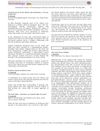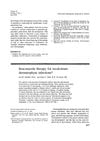
Search
for
Sort by
Research
360-390 / 1000+ results

research Successful Treatment of Hirsutism in HAIR-AN Syndrome Using Flutamide, Spironolactone, and Birth Control Therapy
The document describes a treatment for excessive hair growth in a teenage girl using medication and birth control, but does not report the results.

research Update: The Pathogenesis and Treatment of Polycystic Ovary Syndrome
New treatments for PCOS focus on managing symptoms and improving fertility.

research Dermatological Medications and Local Therapeutics During Pregnancy
Use some skin medications with caution during pregnancy; avoid strong steroids, certain eczema treatments, and systemic retinoids, but many topical treatments and nasal sprays are safe.

research Atypical Folliculitis Caused by Malassezia spp. in Immunosuppressed Patients
Some immunosuppressed patients can get unusual skin infections from Malassezia, which can be treated with antifungal medication.

research Recognizing Polycystic Ovary Syndrome in the Primary Care Setting
Doctors should recognize and treat PCOS early in primary care to manage symptoms and lower risk of other health issues.

research Advances in Dermatology
New insights in skin conditions show a complex link between certain moles and melanoma, improved hair loss treatments, and the need to identify different types of lupus.

research Index
Chemotherapy can cause skin issues and hair loss, and this guide explains how to manage them.

research Classification of the Types of Androgenetic Alopecia (Common Baldness) Occurring in the Female Sex
Common baldness, also known as Androgenetic Alopecia, is caused by a combination of genetic factors and hormones called androgens.

research Effects of Sex Steroid Deprivation and Administration on Hair Growth and Skin Sebum Production in Transsexual Males and Females
Hormone treatments in transsexual individuals reduce hair growth and oil production in male-to-females and increase them in female-to-males.

research The Clinical Evaluation of Hirsutism
Hirsutism is excessive hair growth in women often caused by polycystic ovarian syndrome, and identifying the cause is important for managing associated health risks.

research Adverse Cutaneous Reactions to Antipsychotics
Some patients taking antipsychotic medications experience skin reactions, ranging from mild to severe.

research Cutaneous Effects of the Most Commonly Used Antidepressant Medication, the Selective Serotonin Reuptake Inhibitors
Antidepressants called SSRIs can cause skin problems, bleeding risk, and other side effects.

research Treatment of Alopecia Areata
Some treatments can help with hair regrowth in alopecia areata, but results vary and long-term use is often needed without changing the disease's outcome.

research Physiological Changes of Pregnancy: A Review of the Literature
Most pregnant women experience skin darkening and hair changes, with these effects usually going away after giving birth.

research Tobacco and the Skin: Adverse Effects and Complex Relationships
Smoking harms skin health, causing slower wound healing, more wrinkles, and worsening some skin conditions, but may protect against certain others.

research Acquired Scalp Alopecia: A Review
Early diagnosis and treatment are crucial for preventing permanent hair loss in various scalp conditions, and while new treatments are promising, more research is needed to evaluate their effectiveness.

research Platelet-Rich Plasma for the Aesthetic Surgeon
Platelet-Rich Plasma (PRP) shows promise for hair growth and skin improvement in aesthetic surgery.

research Polycystic Ovary Syndrome: Dermatological Approach
Polycystic Ovary Syndrome can cause hair loss and skin issues, and early treatment is important for preventing complications.

research Hepatic Adenoma in an Adolescent With Elevated Androgen Levels
A teenage girl with high androgen levels and PCOS developed a rare liver tumor, suggesting a possible link between high androgens and the tumor's growth.

research Beneficial Effect of Spironolactone on Androgenic Alopecia
Spironolactone may help reduce hair loss in androgenic alopecia.

research Which Plant for Which Skin Disease? Part 2: Dermatophytes, Chronic Venous Insufficiency, Photoprotection, Actinic Keratoses, Vitiligo, Hair Loss, Cosmetic Indications
Certain plant extracts can effectively treat skin conditions like athlete's foot, chronic vein problems, sun damage, skin growths, vitiligo, and hair loss, and may also improve skin appearance.

research Rash from EGFR Inhibitors: Opportunities and Challenges for Palliation
EGFR cancer drugs often cause a rash, which can lead to distress and isolation, but may also improve outcomes for some cancer patients. Current treatments for the rash are limited, but a compound called menadione shows promise.

research Itraconazole Therapy for Recalcitrant Dermatophyte Infections
Itraconazole helps improve tough skin infections but may not prevent them from coming back.

research Dermatologic Side Effects of Psychopharmacologic Agents
Some psychiatric drugs can cause skin problems, but serious reactions are rare.

research Male Skin and Ingredients Relevant to Male Skin Care
Using specific cleansers and moisturizers with niacinamide improves men's skin hydration and health.

research Preparation and Characterization of Solution-Processed Nanocrystalline p-Type CuAlO2 Thin-Film Transistors
Turmeric may improve knee osteoarthritis, depression, and metabolic syndrome, but evidence is weak.

research Retinoids for Chemoprophylaxis of Nonmelanoma Skin Cancer
Retinoids can prevent skin cancer in high-risk people but have side effects and require more research on dosing and effectiveness.

research Bone Mineral Density Is Unaltered in Women with Polycystic Ovary Syndrome
Women with PCOS have similar bone density to healthy women, but those who are obese have higher bone density at some body sites.

research Hirsutism
Most women with excessive hair growth have PCOS; treatment varies and focuses on preventing new hair, with electrolysis as the only permanent removal method.